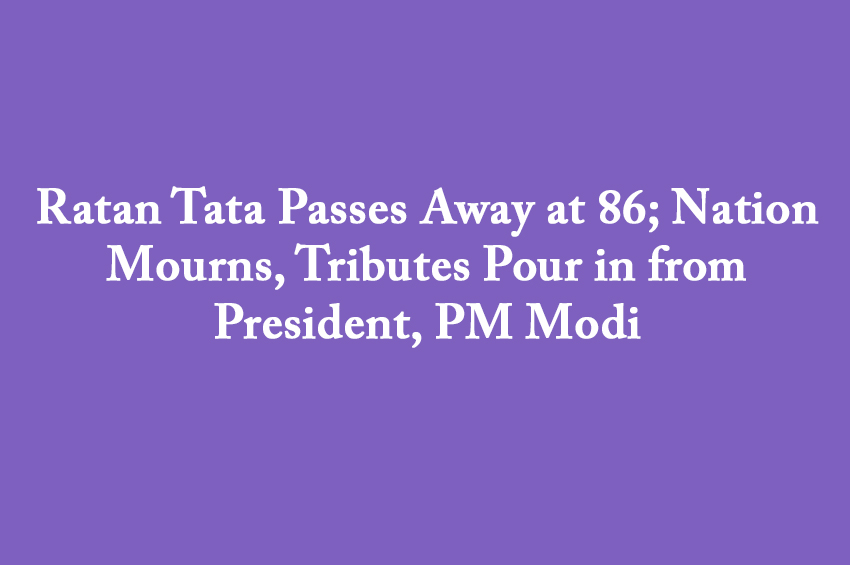Winning Bizness Desk
Mumbai: Ratan Tata, the former chairman of India's Tata Sons, passed away at the age of 86 in Breach Candy Hospital, Mumbai. The industrialist, who led India's oldest business conglomerate, was admitted to the hospital on Wednesday. While there were concerns about his health on October 7, Tata himself reassured the public that there was no reason to worry. Known for his simplicity despite immense business success, Tata lived modestly in a small flat in Mumbai. Tata was instrumental in several landmark projects during his tenure, including launching the Tata Nano, India's most affordable car, and acquiring Air India in a Rs 18,000 crore deal. Honored with the Padma Bhushan and Padma Vibhushan, his leadership transformed the Tata Group into a global powerhouse.
A Challenging Childhood Raised by His Grandmother
Ratan Tata was born on December 28, 1937, to Naval and Soonu Tata. His early life was marked by his parents' separation, and he was raised by his grandmother. Despite nearly marrying four times, he remained a bachelor, once revealing that his grandmother's advice kept him from marrying a woman in America due to the India-China war.
Chairman for 21 Years, Oversaw Growth of Tata Group
Ratan Tata's career began in 1962 on the shop floor of Tata Steel. Rising through the ranks, he became chairman of the Tata Group in 1991, following the retirement of J.R.D. Tata. Under his leadership, the group's profits grew fiftyfold, with international ventures like the acquisition of Jaguar-Land Rover and Tetley contributing to its global success. He stepped down in 2012, and after a brief period of tension, he supported the ousting of his successor Cyrus Mistry in 2016.
Passion for Cars, Books, and Music
Known for his reserved demeanor, Tata was a man of few words. He had a deep love for cars, often remarking on his fascination with their design and mechanics. He also had a passion for classical music, particularly composers like Chopin, Beethoven, and Tchaikovsky. He often expressed his wish to play these symphonies on the piano.
Philanthropy and COVID-19 Response
Throughout his life, Ratan Tata remained deeply involved in philanthropy, overseeing Tata Trusts, which contributed to education, healthcare, and rural development. He ensured that 60-65% of Tata Sons' dividends were directed towards charitable initiatives. During the COVID-19 pandemic, Tata personally donated Rs 500 crore to relief efforts and previously contributed $50 million to Harvard Business School, his alma mater.
Tributes from Across the Nation
N. Chandrasekaran, the chairman of Tata Sons, expressed deep sorrow, calling Tata a "guru, guide, and friend." President Droupadi Murmu honored Tata's legacy of blending corporate success with nation-building, while Prime Minister Narendra Modi called him a "visionary business leader" whose contributions extended far beyond the boardroom. Rahul Gandhi also paid tribute, describing Tata as a man of great vision whose impact on business and philanthropy will be long remembered.
His last major project was the historic acquisition of Air India
Ratan Tata's last major project was the historic acquisition of Air India. Under his leadership, Tata Group successfully reclaimed the iconic airline in 2022, after nearly seven decades of it being government-owned. This deal, valued at Rs 18,000 crore, marked a significant moment in Indian aviation history as Tata Group took control of the debt-laden airline through its subsidiary, Tata Sons, in a government-backed privatization process. Tata had long been associated with the airline industry, as Air India was initially founded by J.R.D. Tata in 1932 before being nationalized in 1953. The acquisition symbolized a full-circle moment for the Tata family, especially given Ratan Tata's legacy of business expansion and global ventures, including Jaguar Land Rover and Tetley. In addition to Air India, Tata's focus remained on enhancing the group's efforts in philanthropy and social impact through Tata Trusts, a cause close to his heart. His active involvement in initiatives related to healthcare, education, and rural development continued till his last years.


